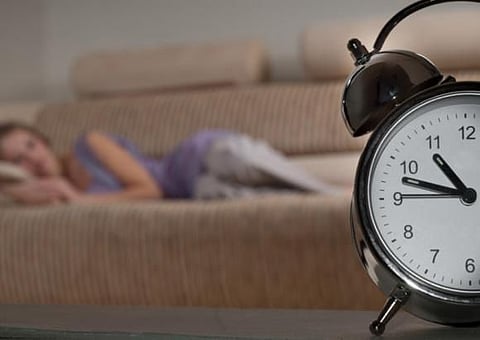Do you suffer from FOGO?
Is staying in too much actually bad for us? Laura Millar investigates

Last week, a friend texted me at 6.30pm saying she was in town, and did I want to meet up with her? At that very moment, I was at home in my pyjamas, about to settle down to watch the last episode of series two of House of Cards on my laptop, and despite not having seen this friend for over a month, I couldn’t think of anything worse.
The outside world can be busy and overwhelming, and sometimes we just want to get off the treadmill of endless socialising – and hibernate.
Like any big city, Dubai is all about the socialising. From brunch at BallarÒ to an evening at Cavalli Club, the party continues every night. Not only can it sometimes be tiring (getting home in the small hours, particularly if you have work the next day) but it can also be expensive; the Dh450 brunches can all add up.
Once you’re moving into your 30s and 40s, you naturally start slowing down as energy levels dip. No longer do you have the energy to dance until 3am, or stay out in the desert long enough to watch the sun come up (well, not every week at least!). And once you’re married and have kids, staying in at the weekend is practically compulsory.
But is it bad to have too much time staying in? Should we try to make more of an effort? Not necessarily, says UK-based life coach Becki Houlston. “If you are genuinely happy to stay in more, and think your social life is fine the way it is, then just keep doing what you’re doing,’’ she says. “We don’t all have to have 3,000 Facebook friends or go out every single night in order to feel popular. If you end up taking on too many things that you don’t actually enjoy, you’re becoming a passenger in your social life, rather than a driver.
“However, it is all about balance. You might have had a hectic day at work, and all you want to do in the evening is unwind and spend time on your own.
“Some people have a ‘pendulum’ approach, where they go out a lot for a short period, then have a lot of nights in.’’
UK-based personal and business coach Georgina Burnett adds, “Going out less could just be the result of a change in tastes. It’s far more likely that if you are settled with a partner, you will be less inclined to go out on a regular basis, but that isn’t always the rule. It is very often a case of too much of a good thing and going out doesn’t have the same appeal anymore.’’
Jane Goodman*, 32, a writer, agrees. “It’s definitely not about being asocial,’’ she says. “I love having a couple of friends round for dinner, where there’s good food and interesting conversation. These nights are often the most fun. Unless you are going to a good restaurant that is not crowded, when you’re hosting at home you’re guaranteed a seat, you can hear what everyone’s saying and if you want to be a bit raucous you can because there are no strangers to take into consideration. Plus, you don’t have to wait for a taxi at the end of the evening; you can just stumble into bed. Perfect!’’
But both Georgina and Becki Houlston argue that going out and interacting with others can also have a positive impact on our health and well-being. “We are all social animals,’’ points out Becki. “Traditionally, we lived and hunted in packs. When you put human beings together, their breathing patterns regulate to the same pace, for example. It’s a biological requirement to be a social animal. We’re not conditioned to hide away from the rest of the world watching Game of Thrones – although it is nice to do that sometimes!’’
Georgina adds, “It’s important not to get stuck in your ways. Limiting yourself to one or two people and the associated environments can make for an insular life and general outlook. We learn a great deal from interacting with others, and this can have a huge impact on our social skills, which are valuable in all areas of life.’’
Going out and meeting people can boost your self-confidence, and help you create new contacts that could come in handy when you are looking for a job or advice in a particular field.
“So compromise to show you’re still sociable; go for a coffee instead of a big Friday night out; join a book club. Find things you have common interests in.’’
It seems that a happy medium can be found. At the end of the day, it’s all about your personal choice. Just don’t get so addicted to your boxsets that you start thinking Harry Potter or Sherlock Holmes are real people; believe it or not, the ones you meet when you’re out and about have the potential to be just as interesting!
Becki Houlston’s top tips
1. Challenge yourself. If you’ve not accepted a social invitation for a while, say yes to the next one you receive.
2. Make small goals for social events, eg, ‘I want to make someone laugh’, or ‘I want to try and make a new friend.’
3. Stop judging or measuring yourself against others who you think of as more sociable than you; they might be just as keen to stay in on the sofa, but they’re making an effort.




